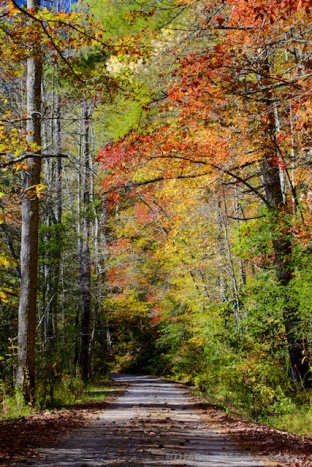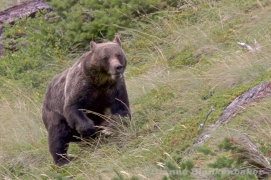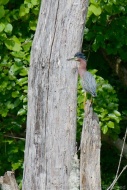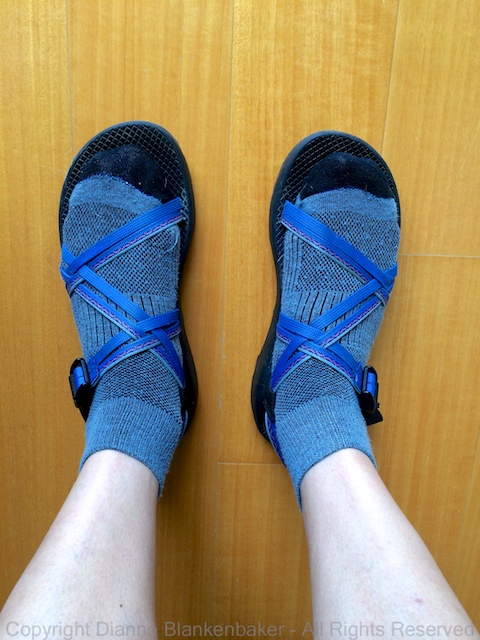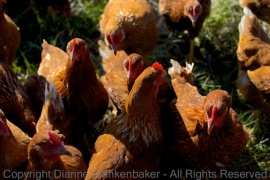
A Red-tailed hawk stopped for a visit, but missed having company by 1 balcony

Flexible legs make this an interesting moment when the hawk was about to turn around

I was not the only spectator fascinated by this fairly bold red-tailed hawk

This red-tail hawk has been hanging out in the ‘hood for the past couple of weeks

This enormous ship had a little trouble squeezing into the port

A floating museum from WWII stopped in Chattanooga for a few days
Last Monday, my course veered undetectably by me. Until the moment my body slammed to the ground–rudely snapped against a boardwalk much like a rag doll without consideration of human bones, ligaments, tendons, organs, and blood–I thought I was simply out riding my bike.
A simple swerve to the right–or was it to the left?–over mist-covered algae growing on a wood boardwalk changed the course of my wheels, my day, and perhaps even my life. The loss of traction was immediate. There was no skid, no slow motion fall, no time to realize I was under attack by the forces of physics that remain as undeniable as death and taxes. I found myself on the ground, shocked.
A tiny version of myself stepped outside my body and tried to make a video of all it could see, but my tiny self’s view was obstructed by the giant helmet on my banged-up head, the bars and shafts that made up my bicycle, my Gulliver-sized legs, and the shadows cast by all. Yet my tiny self was amazed to watch my big self rise up to a seated position and do its best to be sociable with a woman who had stopped to help.
Smiling, making a joke even, denying any serious injury. Above all else, protecting self by refusing to admit any vulnerability to a stranger–even a lone mother walking her infant in a stroller.
All pain was pushed aside. The knot of confusion was barely hinted at in the statement, “I hit my head.” I stood. I walked. She rolled my bike along. I sat on a bench, she parked my bike next to me, assured me she would be back shortly to check on me and disappeared both visually and in my memory until hours later when I suspected I’d dreamt her. Then, later still, the video my tiny self made was unlocked from some deep archive and returned to my big self for viewing.
Yet, I remembered I had a phone. I remembered where it was. I remembered the password to unlock it. I remembered how to call my husband. I asked him to come and get me. My tiny self was fully back onboard with my big self at this point–there was no video for me to return to later.
I still cannot recall the conversation with my husband. Nor can I recall the quarter-mile walk I undertook to meet him at the nearest street–I had fallen on a pedestrian-only portion of the Tennessee Riverwalk.
What I do recall is a moment of utter panic. Of being uncertain that I was going in the right direction, uncertain of where I was, uncertain as to what was happening. I choked down an urge to sob. I gave up crying long ago, after my mother’s funeral. My mother was the only person I ever knew with a healthy respect for a stranger’s tears–the only person I knew who was comfortable to just allow them. For everyone else, they are at least a source of discomfort if not disgust.
I keep mine close. Occasionally, I allow moisture in deep empathy for someone else’s pain. But if you see a tear for my own pain, it’s either a once in a decade occurrence or you’re someone I trust with my life.
To be standing on a street corner lost and confused and blubbering would be the most vulnerable I’ve ever felt in my life. Standing on a street corner lost and confused was close enough. I swallowed hard, choked once, blinked away any tear that had dared to form, and recalled my phone.
I scoured my muddled mind for a memory of having spoken to my husband recently. A vague impression of having had a conversation formed much like a shape bubbling up briefly from under quicksand, then sinking and disappearing again. I wanted to reach for the memory, but feared grabbing it would mire me in muck so deep I might not surface again. I let it go.
I dialed my husband again. The words that came were, “Are you coming to get me? I’m so confused.” And I choked back a sob for a second time.
He talked to me from that moment until he arrived to pick me up. His voice my lifeline through the quicksand of my mind. Then, he scooped me safely into our van where a wet muzzle reached from behind my seat to check on me, reminding me my boys will protect me and care for me when I will let them. It’s the letting them that’s always the hardest part.
In the ER, I learned I had a concussion. Nothing dangerous or permanent, just scary. I was sent home to heal with instructions not to watch TV, use any electronic devices with a screen, or read any non-fiction. Thankfully, I was allowed to sleep.
I thought I would be fine in 2 days. I was not. The more I learn, the more I realize this isn’t something you recover from at the same rate as the 24-hour flu.
I’ve also learned that bike helmets don’t offer much protection against concussions. I’ve found one that promises a novel design technology called MIPS that’s supposed to have slightly better protection than traditional bike helmets against concussions. At $219, it seems pricey. When I get the ER bill, it will seem like a bargain if it works.
I will heal and I will ride again. But the experience of temporary dementia haunts me. I find myself wondering if more than my tires veered.
